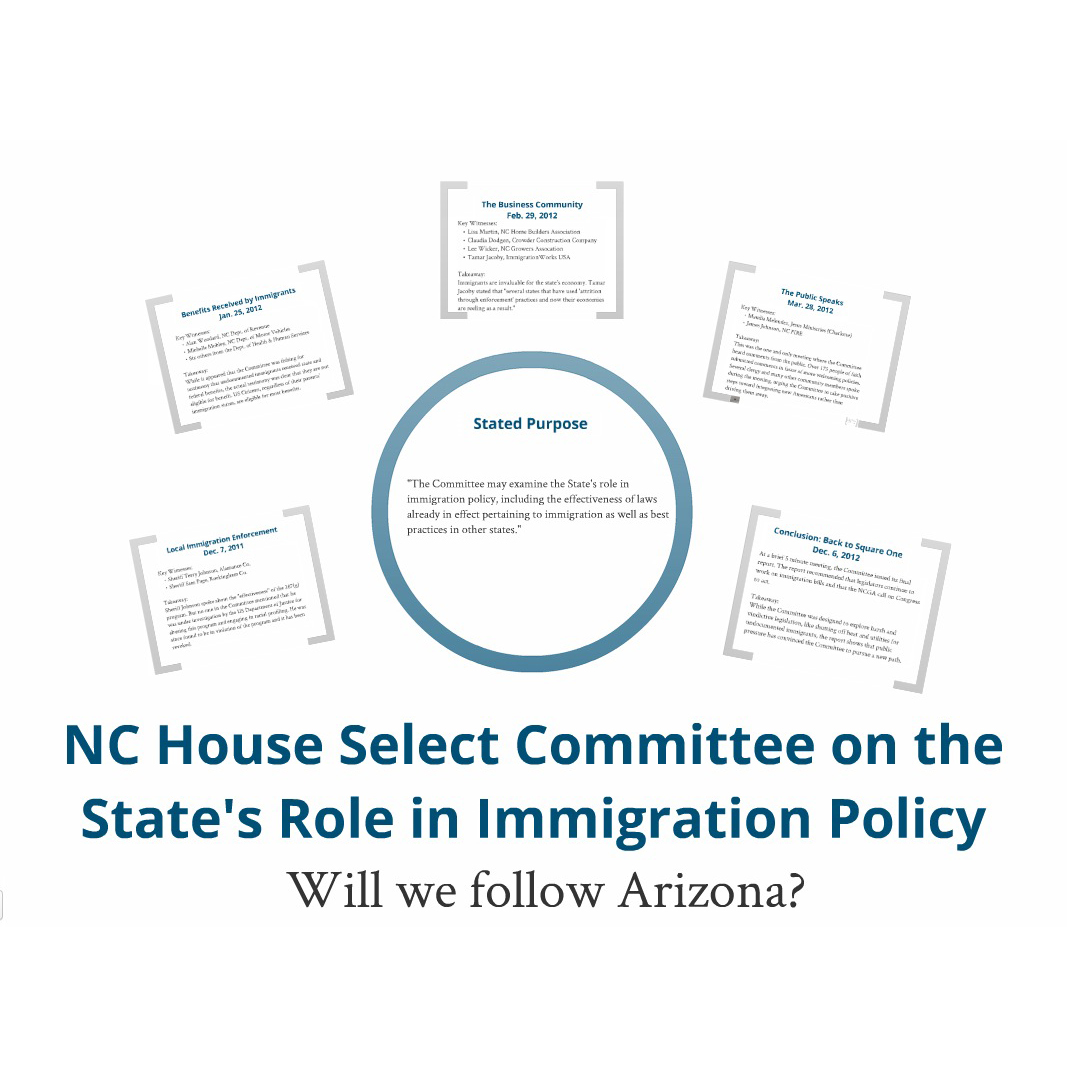The NC House Select Committee on the State’s Role in Immigration Policy issued its final report yesterday – a bland 16 pages with the main recommendation that the 2013 General Assembly “continue to review and revise previously introduced, but not enacted, immigration legislation and solicit input from a wide array of interested stakeholders.” In other words, keep introducing stuff like you did last session. The Committee also recommended that the General Assembly pass resolutions asking Congress (and the NC delegation in particular) to update federal immigration laws and enforcement. Finally, the Committee recommended “increased discussion among entities with economic interest in the issues…”
While the stakes are very high – the lives and livelihoods of thousands of NC families hang in the balance – it has always been hard to take this Committee seriously. It has been clear from the start that this Committee’s goal was never to engage in real dialogue, but rather to stack the deck in favor of increased enforcement against immigrants. For example, at its first meeting nearly a year ago, its first witness was Sheriff Terry Johnson of Alamance County, who testified in favor of the 287(g) program. One problem: at the time, Sheriff Johnson was under investigation by the US Department of Justice for abusing the program by engaging in rampant racial profiling. He has since been found in violation of the program and it was immediately shut down.
There was only one meeting that was open for public comment, and the NC Council of Churches helped collect more than 175 comments from across the state (including more than 50 from clergy). Bishop Michael Curry of the Episcopal Diocese of North Carolina and other pastors, including Rev. Isaac Villegas of Chapel Hill Mennonite Church, spoke eloquently in favor of adopting a welcoming posture toward new American families instead of trying to divide communities, separate families, and drive people away. After this March 2012 meeting, the Committee decided to wait on the US Supreme Court decision on Arizona law SB1070. Of course, in June the Court struck down most of those provisions. The one provision that it did not strike down was left open to future legal challenges.
With this report, the Committee is in effect conceding that it cannot push for Arizona or Alabama-style legislation. While there is no doubt that some members of the General Assembly will cynically attempt to pass new measures that target immigrants, the immigrant rights community in North Carolina can stand proud. There are many battles that lay ahead, but at least for now disaster has been averted thanks to the courage of undocumented protesters and the strong immigrant rights partnerships that are being forged across the state. The NC Council of Churches is pleased to be part of these partnerships and is grateful for the many denominational leaders, pastors, and lay people who have spoken out on behalf of “welcoming the stranger.”
A powerful statement by the statewide We Are NC coalition summarizes the outcome of the Committee’s work:
The report’s release comes the same week as former President George W. Bush reiterated his support for reforming our broken immigration system; as a bipartisan Illinois state Senate voted in favor of undocumented immigrants’ access to driver licenses; and as House Speaker Thom Tillis stated that he has no interest in a sweeping anti-immigrant bill in North Carolina. While Rep. Harry Warren originally wanted to use this committee to explore harsh and vindictive legislation, like shutting off heat and utilities for undocumented immigrants, today’s report shows that public pressure has convinced the committee to pursue a new path.
We hope, as the committee recommended, that the state’s congressional delegates in Washington, DC take leading roles in shaping a just, fair and humane immigration policy that keeps families together, protects workers and supports businesses.. We also support the Committee’s clear recommendation that the 2013 General Assembly “solicit input from a wide array of interested stakeholders” and that North Carolina take a pragmatic approach to immigration policy.
However the political winds blow, we will continue our work to help make North Carolina a welcoming state for all people. You can join us by signing up for our monthly Faith + Immigration e-newsletter.

